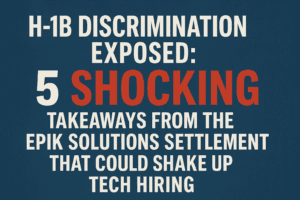H-1B Discrimination Exposed: 5 Shocking Takeaways from the Epik Solutions Settlement That Could Shake Up Tech Hiring
The U.S. Justice Department’s settlement with tech recruiter Epik Solutions marks a sharp turn in enforcing fair hiring. Epik was penalized for illegally excluding U.S. citizens from job ads, explicitly favoring foreign H-1B visa holders. This first settlement under the revived “Protecting US Workers Initiative” signals the end of federal tolerance for such discrimination. Beyond the $72,000 fine, Epik must overhaul its practices and undergo monitoring, proving enforcement has teeth.
Crucially, the action targets recruiters – key hiring gatekeepers – and highlights how preferring H-1B workers (often tied to employers) can unlawfully sideline Americans. It’s a direct warning to the tech industry: prioritizing visa status over merit and excluding U.S. workers violates fundamental rights and carries serious consequences. This renewed focus aims to ensure Americans get a fair shot at opportunities in their own country.

H-1B Discrimination Exposed: 5 Shocking Takeaways from the Epik Solutions Settlement That Could Shake Up Tech Hiring
The recent $71,916 settlement between the U.S. Department of Justice (DOJ) and tech recruiting firm Epik Solutions isn’t just a routine fine. It’s a sharp flare signaling a significant shift in federal enforcement priorities regarding American workers and the controversial H-1B visa program. Understanding the nuances reveals far more than a simple case of wrongdoing.
The Core Violation: Not Just Preference, But Explicit Exclusion
According to the DOJ’s investigation, Epik Solutions didn’t merely lean towards H-1B visa holders; they actively excluded US workers. Their job advertisements explicitly stated a preference for foreign workers on H-1B visas, effectively shutting the door on qualified American citizens before they could even apply. This constitutes a clear violation of the anti-discrimination provisions (8 U.S.C. § 1324b) within the Immigration and Nationality Act (INA). It wasn’t about seeking specialized skills unavailable domestically; it was about systematically sidelining US citizens.
The “Protecting US Workers Initiative”: Back with Teeth
This settlement is the first fruit of the DOJ’s revived “Protecting US Workers Initiative.” Assistant Attorney General Harmeet K. Dhillon’s statement was unequivocal: “The days of the federal government looking the other way on American workforce protection are over.” This marks a stark departure from perceived lax enforcement in previous years. The initiative’s relaunch signals:
- Increased Scrutiny: Expect more investigations into recruitment practices, especially in sectors heavily reliant on H-1B visas like tech.
- Strict Adherence to Non-Discrimination: Job postings must be open to all legally authorized workers. Explicit preferences for H-1B holders over US citizens are illegal.
- Accountability for Recruiters: The action against Epik, a recruiting firm, highlights that intermediaries facilitating hiring are equally liable, not just the end employers.
The Settlement’s Sting: More Than Just a Fine
While the $71,916 civil penalty grabs headlines, the non-monetary requirements are arguably more impactful for preventing future harm:
- Policy Overhaul: Epik must completely revise its recruitment and hiring practices to ensure compliance.
- Training Mandate: Staff must undergo training on the INA’s anti-discrimination provisions.
- Audits & Reporting: The DOJ will monitor Epik’s compliance for two years, requiring detailed reports on job ads and placements.
- Cease Discriminatory Ads: An immediate end to ads excluding US workers.
This creates a compliance framework designed for lasting change, not just a one-time punishment.
The Bigger Picture: H-1B Use Under the Microscope
This case lands squarely in the center of the ongoing, heated debate about the H-1B visa program:
- Legitimate Use vs. Abuse: The H-1B program is designed to fill genuine gaps in the US workforce with specialized talent, not to replace qualified American workers or suppress wages. Cases like Epik fuel criticism that the program is being misused for the latter purposes.
- Worker Vulnerability: The DOJ action implicitly acknowledges the power imbalance. Foreign workers on H-1B visas are often tied to their sponsoring employer, making them potentially less likely to report labor violations or negotiate wages aggressively. Preferring them because of this perceived vulnerability is unlawful discrimination against US workers.
- A Warning to the Tech Industry: The tech sector, reliant on global talent, must now navigate this stricter enforcement landscape meticulously. Recruiters and employers must ensure their hiring practices are demonstrably fair and focused on skills, not visa status.
The Human Impact: Protecting Opportunity
Beyond legal technicalities, this settlement is fundamentally about protecting the right of US citizens to compete fairly for jobs in their own country. When recruiters like Epik build walls around opportunities based on nationality, they deny skilled Americans a chance to contribute and advance. The DOJ’s action reaffirms that this exclusion is unacceptable.
What Does This Mean Going Forward?
- For US Workers: This is a tangible enforcement mechanism. If you encounter job ads explicitly preferring H-1B holders or feel discriminated against based on citizenship status, report it to the DOJ’s Civil Rights Division.
- For Employers & Recruiters: Scrutinize your job descriptions, recruitment processes, and hiring criteria immediately. Ensure compliance isn’t just a checkbox but ingrained in practice. Document legitimate business needs for specific visa sponsorships meticulously.
- For the H-1B Program: Expect continued intense scrutiny and debate. Cases like this bolster arguments for reform focused on preventing worker displacement and ensuring the program truly targets specialized skills shortages.
The Epik Solutions settlement is more than a penalty; it’s a declaration. The federal government is actively reclaiming its role as an enforcer of fair labor practices in the complex arena of immigration and employment. The message is clear: discriminating against US workers in favor of foreign visa holders is illegal, and the DOJ is now watching closely. The era of “looking the other way” is decisively over.
You must be logged in to post a comment.